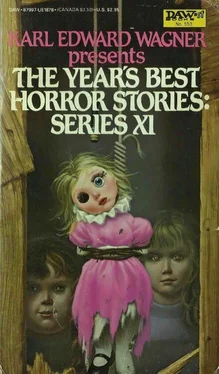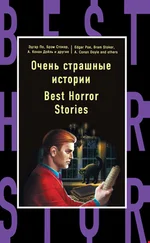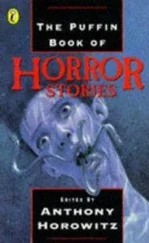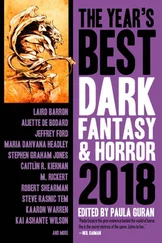The light just managed to reach the walls, however dimly. There was nobody in sight. On either side of the screen, which looked like a rectangle of fog, the theater boxes were cups of darkness. It was hard to distinguish shadows from dim objects, which perhaps was why the rows of seats looked swollen.
The thieves must have retreated into one of the corridors, toward their secret entrance; he could hear distant muffled sounds. No doubt they were waiting for him to give up—but he would surprise them.
He stepped over a pile of rubble just beyond the wall. They mustn’t have had time to clear it away when they had made the gap. The flashlight was heavy, reassuring; they’d better not come too near. As soon as he reached the near end of a row of seats and saw that they were folded back out of his way, he switched off the light.
Halfway down the row he touched a folding seat, which felt moist and puffy—fatter than it had looked. He didn’t switch on the light, for he oughtn’t to betray his presence more than was absolutely necessary. Besides, there was a faint sketchy glow from the road, through the shop. At least he would be able to find his way back easily—and he’d be damned if anyone else got there first.
When he reached the central aisle he risked another blink of light, to make sure the way was clear. Shadows sat up in all the nearest seats. A few springs had broken; seats lolled, spilling their innards. He paced forward in the dark, stopping frequently to listen. Underfoot, the carpet felt like perished rubber; occasionally it squelched.
At the end of the aisle he halted, breathing inaudibly. After a while he heard movement resounding down a corridor to his left. All at once—good Lord, he’d forgotten that—he was glad the sounds weren’t coming from his right, where the Gents’ had been and still was, presumably. Surely even thieves would prefer to avoid the yard beyond that window, especially at night.
Blinking the light at the floor, he moved to his left. The darkness hovering overhead seemed enormous, dwarfing his furtive sounds. He had an odd impression that the screen was almost visible, as an imperceptible lightening of the dark above him. He was reminded of the last days of the cinema, in particular one night when the projectionist must have been drunk or asleep: the film had slowed and dimmed very gradually, flickering; the huge almost invisible figures had twitched and mouthed silently, unable to stop—it had seemed that the cinema was senile but refusing to die, or incapable of dying.
Another blink of light showed him the exit, a dark arch a head taller than he. A few scraps of linoleum clung to the stone floor of the low corridor. He remembered the way: a few yards ahead the corridor branched; one short branch led to a pair of exit doors, while the other turned behind the screen, toward a warren of old dressing rooms.
When he reached the pair of doors he tested them, this time from within the building. Dim light drew a blurred sketch of their edges. The bars which ought to snap apart and release the doors felt like a single pole encrusted with harsh flakes. His rusty fingers scraped as he rubbed them together. Wind flung itself at the doors, as unable to move them as he was.
He paced back to the junction of the corridors, feeling his way with the toes of his shoes. There was a faint sound far down the other branch. Perhaps the thieves were skulking near their secret entrance, ready to flee. One blink of the light showed him that the floor was clear.
The corridor smelled dank and musty. He could tell when he strayed near the walls, for the chill intensified. The dark seemed to soak up those of his sounds that couldn’t help being audible—the scrape of fallen plaster underfoot, the flap of a loose patch of linoleum which almost tripped him and which set his heart palpitating. It seemed a very long time before he reached the bend, which he coped with by feeling his way along the damp crumbling plaster of the wall. Then there was nothing but musty darkness for an even longer stretch, until something taller than he was loomed up in front of him.
It was another pair of double doors. Though they were ajar, and their bars looked rusted in the open position, he was reluctant to step through. The nervous flare of his light had shown him a shovel leaning against the wall; perhaps it had once been used to clear away fallen plaster. Thrusting the shovel between the doors, he squeezed through the gap, trying to make no noise.
He couldn’t quite make himself switch off the flashlight. There seemed to be no need. In the right-hand wall were several doorways; he was sure one led to the secret entrance. If the thieves fled, he’d be able to hear which doorway they were using.
He crept along the passage. Shadows of dangling plaster moved with him. The first room was bare, and the color of dust. It would have been built as a dressing room, and perhaps the shapeless object, huddled in a corner and further blurred by wads of dust, had once been a costume. In the second deserted room another slumped, arms folded bonelessly. He had a hallucinatory impression that they were sleeping vagrants, stirring wakefully as his light touched them.
There was only one movement worth his attention: the stealthy restless movement he could hear somewhere ahead. Yes, it was beyond the last of the doorways, from which—he switched off the flashlight to be sure—a faint glow was emerging. That must come from the secret entrance.
He paused just ahead of the doorway. Might they be lying in wait for him? When the sound came again—a leathery sound, like the shifting of nervous feet in shoes—he could tell that it was at least as distant as the far side of the room. Creeping forward, he risked a glance within.
Though the room was dimmer than fog, he could see that it was empty: not even a dusty remnant of clothing or anything else on the floor. The meager glow came from a window barred by a grille, beyond which he heard movement, fainter now. Were they waiting outside to open the grille as soon as he went away? Flashlight at the ready, he approached.
When he peered through the window, he thought at first there was nothing to see except a cramped empty yard: gray walls which looked furred by the dimness, gray flagstones, and—a little less dim—the sky. Another grille covered a window in an adjoining wall.
Then a memory clenched on his guts. He had recognized the yard.
Once as a child, he had been meant to sneak into the Gents’ and open the window so that his friends could get in without paying. He’d had to stand on the toilet seat in order to reach the window. Beyond a grille whose gaps were thin as matchsticks, he had just been able to make out a small dismal space enclosed by walls which looked coated with darkness or dirt. Even if he had been able to shift the grille he wouldn’t have dared to do so, for something had been staring at him from a corner of the yard.
Of course it couldn’t really have been staring. Perhaps it had been a half-deflated football; it looked leathery. It must have been there for a long time, for the two socketlike dents near its top were full of cobwebs. He’d fled, not caring what his friends might do to him—but in fact they hadn’t been able to find their way to the yard. For years he hadn’t wanted to look out of that window, especially when he’d dreamed—or had seemed to remember—that something had moved, gleaming, behind the cobwebs. When he’d been old enough to look out of the window without climbing up, the object was still there, growing dustier. Now there had been a gap low down in it, widening as years passed. It had resembled a grin stuffed with dirt.
Again he heard movement beyond the grille. He couldn’t quite make out that corner of the yard, and retreated, trying to make no noise, before he could. Nearly at the corridor, he saw that a door lay open against the wall. He dragged the door shut as he emerged—to trap the thieves, that was all; if they were in the yard that might teach them a lesson. He would certainly have been uneasy if he had still been a child.
Читать дальше












